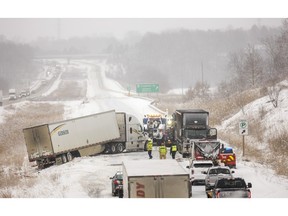Six years after Humboldt tragedy, N.B. puts in mandatory truck training
But official with trucking association says most commercial firms already exceed the new standard set by province

Article content
New Brunswick is making training mandatory for new truck drivers, six years after 16 people on the Humboldt Broncos hockey team bus were killed in a horrific highway crash that made headlines across the country.
On Monday, the provincial government announced the new requirement April 1 without mentioning the Saskatchewan tragedy, caused by a truck driver who ignored a flashing stop sign at a T-junction and drove his semi-truck into the team bus at 100 kilometres an hour.
The driver had immigrated from India and only had two weeks of truck driver training.
“Mandatory training will ensure new commercial truck drivers possess the basic knowledge and driving skills to help improve highway safety for all New Brunswickers,” said Public Safety Minister Kris Austin in a news release.
The initiative adopts training standards consistent with the National Safety Code, ensuring truckers in New Brunswick receive the same instruction as those in other places in Canada. New Brunswick will become the eighth of 13 provinces and territories to introduce the mandatory training.
Chris McKee, the executive director of the Atlantic Provinces Transportation Association, told Brunswick News Ottawa changed the national code in the aftermath of the Saskatchewan tragedy, but it was adopted more quickly by the western provinces and Ontario.

“Basically, after Humboldt, the federal government wanted a national standard for entry-level truck driver training,” he said. “So as a part of that, they amended the National Safety Code.”
The new standard dictates slightly more than 100 hours of training in the classroom and behind the wheel.
The new training program is better than having nothing.
Chris McKee
But McKee pointed out that most commercial trucking firms in New Brunswick already impose their own, higher standard for training before they employ someone who successfully passes the provincial Class 1 licence test. The 12-week program includes 320 hours of school time plus a 100-hour internship program in which a new driver is in a truck with a trainer from a commercial firm.
“The new training program is better than having nothing,” McKee said, noting that a fly-by-night outfit that doesn’t belong to his association could put novice drivers on the roads without proper training.
The driver in the Humboldt crash, Jaskirat Singh Sidhu, was sentenced to eight years in prison after pleading guilty to dangerous driving charges. Last year he was released on day parole and is fighting deportation to India.
The Calgary trucker and permanent resident had blown through a stop sign on April 6, 2018, at a rural intersection near Tisdale, Sask., and drove into the path of the bus carrying the junior hockey team to a playoff game. Besides the 16 who were killed, 13 were injured, many severely.

Sukhmander Singh, the owner of the small trucking firm who had employed Sidhu, was charged with violating federal and provincial safety regulations and fined $5,000.
The new requirement in New Brunswick will be grandfathered in, meaning drivers who already hold a Class 1 licence will not have to take the mandatory training.
McKee said he’s glad the province listened when it consulted his association in December. New Brunswick will not require commercial drivers who immigrate from other countries to do the mandatory training if there’s a reciprocal agreement between the two nations or if the driver can prove he or she has lots of experience.
The industry is facing a driver shortage nation-wide, and in the Atlantic provinces the problem is acute because nearly half of the 25,000 commercial truck drivers are 55 or older and nearing retirement, according to the association.
Last fall, the last year for which statistics are available, there were 975 vacant positions out of about 20,000 available transport truck driver jobs in New Brunswick and Nova Scotia, putting pressure on companies to find recruits.











Postmedia is committed to maintaining a lively but civil forum for discussion. Please keep comments relevant and respectful. Comments may take up to an hour to appear on the site. You will receive an email if there is a reply to your comment, an update to a thread you follow or if a user you follow comments. Visit our Community Guidelines for more information.